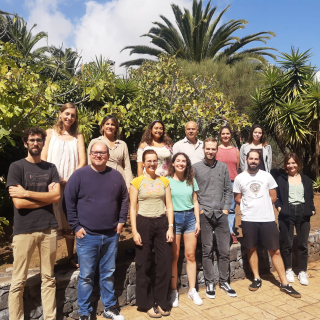Bibcode
de la Rosa, I. G.; Vazdekis, A.; Ferré-Mateu, A.
Referencia bibliográfica
Monthly Notices of the Royal Astronomical Society, Volume 431, Issue 1, p.440-454
Fecha de publicación:
5
2013
Número de citas
37
Número de citas referidas
34
Descripción
Recent results on the non-universality of the Initial Mass Function
(IMF) have shown strong evidence of IMF variations with galaxy velocity
dispersion, with a corresponding impact on other stellar population
parameters, line indices and colours. Using a set of stellar population
models with varying IMF slopes, we provide additional caveats on the
assumption of a universal IMF. This study shows that the derived star
formation histories of early-type galaxies vary significantly with the
IMF slope. For instance, a steepening in the slope of a single power-law
IMF decreases substantially, by a factor of up to 4, the contribution of
the old stellar populations to the total light/mass. This trend is
milder for a segmented-like IMF shape, where the contribution of the
very low mass stars is decreased. It is also shown that, by tuning each
IMF slope to its prescribed value according to each galaxy velocity
dispersion, a sample of early-type galaxies covering a range of masses
yield comparable star formation histories. On the one hand, a small
contribution from relatively young stellar populations appears in the
star formation histories of most massive elliptical galaxies when
adopting a steep IMF. In addition, we find that low-mass early-type
galaxies that look like genuinely young objects with a standard IMF
(i.e. `baby elliptical galaxies') turn out to be older when a slightly
flatter IMF is employed. In summary, the use of a non-universal IMF,
tuned according to the velocity dispersion of the galaxy, seems to
provide more consistent results.
Proyectos relacionados

Huellas de la Formación de las Galaxias: Poblaciones estelares, Dinámica y Morfología
Bienvenida a la página web del g rupo de investigación Traces of Galaxy Formation. Somos un grupo de investigación amplio, diverso y muy activo cuyo objetivo principal es entender la formación de galaxias en el Universo de una manera lo más completa posible. Con el estudio detellado de las poblaciones estelares como bandera, estamos constantemente
Ignacio
Martín Navarro